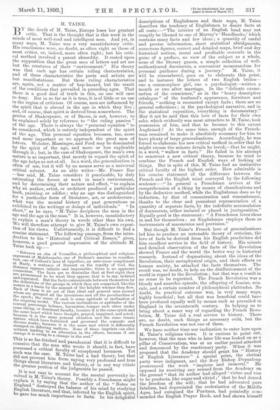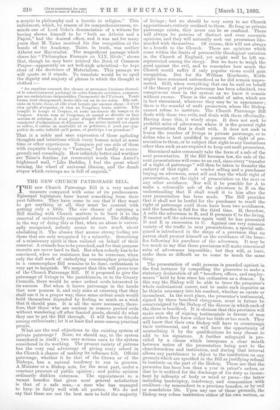M. TAINE.
BY the death of M. Taine, Europe loses her greatest critic. That is the thought that is this week in the minds of most well-read and intelligent men. And yet, in many ways, M. Taine was a very unsatisfactory critic. His conclusions were, no doubt, as often right as those of most critics, or, indeed, more often right; but his criti- cal method involved a patent absurdity. It rested upon the supposition that the great men of letters and art are but the creatures of their "environment." His theory was that each age has certain ruling characteristics, and of these characteristics the poets and artists are but manifestations. But these ruling characteristics are, again, not a matter of hap-hazard, but the result of the conditions that prevailed in preceding ages. That there is a good deal of truth in this, no one will care to deny. But in so far as it is true, it is of little or no use in the region of criticism. Of course, men are influenced by the spirit that is abroad in the age in which they live ; and, of course, that spirit is derived from somewhere. The genius of Shakespeare, or of Bacon, is not, however, to be explained solely by reference to "the ruling passion" of the age. There is always the "personal equation" to be considered, which is entirely independent of the spirit of the age. This personal equation becomes, too, more and more important as we approach the great men of letters. Webster, Massinger, and Ford may be dominated by the spirit of the age, and more or less explicable through it ; but, in the case of Shakespeare, the man's own nature is so important, that merely to regard the spirit of the age helps us not at all. In a word, the generalisation is often of use, but it will by no means serve as a universal critical solvent. As an able writer—Mr. Fraser Rae —has said, M. Taine considers it practicable, by duly estimating the forces at work in man's environment, and by determining their nature and effect, "to explain Why an author, artist, or architect produced a particular book, painting, or edifice ; why an age 'was distinguished for a particular form of literature, art, or architecture ; what was the mental history of past generations as exhibited in the writings or doings of individuals." "In Short," as he says, "M. Taine deciphers the man in the age and the age in the man." It is, however, unsatisfactory to explain a man's theory in words other than his own. We will therefore attempt to give M. Taine's own exposi- tion of his views. Unfortunately, it is difficult to find a concise statement. The following passage, from the intro- duction to his "Historical and Critical Essays," gives, however, a good general impression of the attitude M. Taine took up :— "Botweee an elm of Versailles, a philosophical and religious argument of Malebranche, one of Boileau's maxims in versifica- tion, one of Colbert's laws of hypothec, an ante-room compliment at Marin, a sentence of Bossuet on the royalty of God, the distance appears infinite and impassable, there is no apparent connection. The facts are so dissimilar that at first sight they ated pronounced tO be what they appear, that is to say, isolated separated. But the facts communicate between themselves by the definitions of the groups in which they are comprised, like the waters in a basin by the summit of the heights whence they flow. Each of them is an act of that ideal and general man around
whom are . , .
the epoch; the all the inventions and all the peculiarities of poch; the cause of each is some aptitude or inclination of the reigning model. The various inclinations or aptitudes of the central personage balance, harmonise, temper each other under the e liking, or dominant faculty, because it is the same spirit and bhecasuasme.hteart which have thought, prayed, imagined, and acted ; nature 111.11 the same general situation and the same innate diverse works; have fashioned and governed the separate and stamped :lir :134 because it is the same seal which is differently without leading to matters. None of these imprints can alter change it is owl o an alteration in the others, because if one
ng to a change in the seal."
This is so far-fetched and paradoxical that it is difficult to conceive that the man who wrote it should, in fact, have possessed a critical faculty of exceptional keenness. Yet such was the case. M. Taine had a bad theory, but that did not prevent him from ay' g very profound and true out literature d k .181 tn0-ryv, or in any way vitiate things ale the greater portion of the judgments he passed. It is not easy to account for the mental perversity in- volved in M. Taine's theory, Possibly a Frenchman might explain it by saying that 't t11 e author of the "Notes on England" destroyed the balance of his mind by studying English literature, and that, infected by the English spirit, he gave too much importance to facts. In his delightful descriptions of Englishmen and their ways, M. Taine describes the tendency of Englishmen to desire facts at all costs :—" The interior of an English head may not unaptly be likened to one of Murray's 'Handbooks,' which contains many facts and few ideas ; a quantity of useful and precise information, short statistical abridgments, numerous figures, correct and detailed maps, brief and dry historical notices, moral and profitable counsels in the guise of a preface, no view of the subject as a whole, none of the literary graces, a simple collection of well- authenticated documents, a convenient memorandum for personal guidance during a journey." M. Taine, it will be remembered, goes on to elaborate this point, and to instance the letters of two English brides— one a commonplace girl, one a psychologist—written a month or two after marriage. In the "delicate exami- nation of the conscience," as in the "heavy descriptive catalogue" of the husband's appearance, furniture and friends, "nothing is recounted except facts ; there are no general reflections ; in the psychological narrative, and in the statistical exposition, everything is documentary." May it not be said that this love of facts for their own sake, which evidently was most attractive to M. Taine, took possession of him, and that he became to this extent Anglicised ? At the same time, enough of the French- man remained to make it absolutely necessary for him to have plenty of large generalisations. Accordingly, he was forced to elaborate his new critical method in order that he might excuse the minute details he loved,—that he might, in a word, "wallow in facts." He failed in his attempt to construct a new critical theory, because he tried to combine the French and English ways of looking at things. But in spite of this, M. Taine had an instinctive critical faculty of the highest order. How admirable is his concise statement of the difference between the French and the English mind conveyed by the following sentence :—" In general a Frenchman arrives at the comprehension of a thing by means of classifications and by the deductive method, while the Englishman does so by induction, by dint of concentration and remembrance, thanks to the clear and persistent representation of a quantity of separate facts, by the indefinite accumulation of documents, either isolated or placed in juxtaposition." Equally good is the statement : "A Frenchmen loves ideas in and for themselves ; an Englishman employs them as instruments of mnemonics and prevision."
But though M. Taine's French love of generalisations led him to produce an untenable theory of criticism, the love of facts he derived from his English proclivities did him excellent service in the field of history. His minute and detailed observation of the facts of the Revolution showed France and the world the better way in historical research. Instead of dogmatising about the ideas of the Revolution, their metaphysical origin, and their effects on human society, he attacked the facts themselves. The result was, no doubt, to help on the disillusionment of the world in regard to the Revolution ; but that was a result in no sense to be regretted. The French Revolution was a bloody and anarchic episode, the offspring of famine, mis- rule, and a certain number of philosophical platitudes. No doubt, its practical outcome was, in very many ways, highly beneficial ; but all that was beneficial could have been produced equally well by means such as prevailed in England in the seventeenth century. In helping us to bring about a saner way of regarding the French Revo- lution, M. Taine did a real service to history. There are, no doubt, such things as necessary evils, but the French Revolution was not one of them.
We have neither time nor inclination to enter here upon M. Taine's religious views. It is curious to point out, however, that the man who in later life was looked on as a pillar of Conservatism, was at an earlier period attacked and denounced by the reactionary party. When it was proposed that the Academy should grant his "History of English Literature" a special prize, the clerical party were indignant, and the fiery Bishop Dupanloup pronounced the work "impious and immoral." He opposed its receiving any reward from the Academy on the ground "that its author had alleged virtue and vice to be products, like sugar and vitriol ; ' that he had denied the freedom a the will; that he had advocated pure fatalism, had depreciated the ecclesiastics of the Middle Ages, had eulogised the Puritans, had pointedly ccm- mended the English Prayer Book, and had shown himself a sceptic in philosophy and a heretic in religion." This indictment, which, by reason of its comprehensiveness, re- minds one of Lord Coke's denunciation of a witness for having shown himself to be "both an Atheist and a Papist," had the desired effect, and it was not for many years that M. Taine received his due recognition at the hands of the Academy. Taine, in truth, was neither Atheist nor Materialist. The magnificent passage which closes his " Philosophes Francais au XIX. Siècle," shows that, though he may have praised the Book of Common Prayer—apparently an act well-nigh atheistical—he kept clear of the doctrines of Materialism. This passage we will quote as it stands. To translate would be to spoil the dignity and majesty of phrase in which the thought is clothed :— "Au supreme sommet des °hoses se prononce l'axiome eternel, et le retentissement prolonge de cette formule oreatrieo, compose, par sea ondulations inepuisables,l'immensite de l'Univers. Toute forme, tout changement, toute idee eat un de ses actes. Elle sub- sists en touts chose, et elle n'est borne° par aucune chose : ii n'est rien qu'elle n'exprime, et rien ne l'exprime toute entthre. Elle remplit le temps et l'espace, et reste au-dessus du temps et de ]'espe,ce. Aucun nom no l'exprime, et quand se &voile sa face amine et sublime, il n'est point d'esprit d'homme qui no ploie consterne d'admiration et d'horreur. Au memo instant cot esprit se releve, il oublie sa mortalite et sa petitesse, d jouit par sym-
path is de cette infinite pense, et participe i sa grandeur. '
That is a noble and sane expression of those agitating thoughts and intuitions which every human mind at some time or other experiences. Tennyson put one side of them with exquisite beauty in "Vastness," but hardly so coura- geously and consolingly. How infinitely better and worthier are Taine's fearless yet reverential words than Araiel's frightened wail, "Like Buddha, I feel the great wheel turning, the wheel of universal illusion, and the dumb stupor which enwraps me is full of anguish."



































 Previous page
Previous page